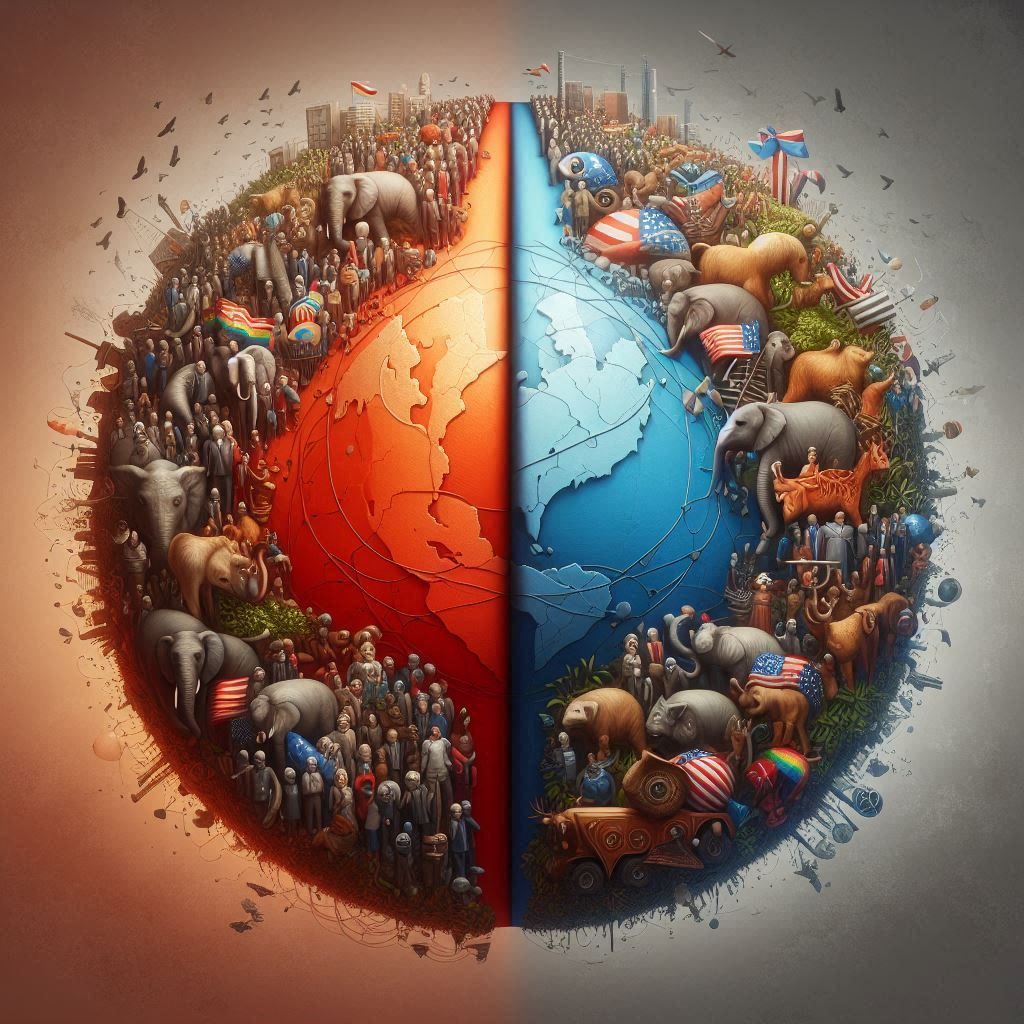The Partisan Divide: How Domestic Discontent Fuels Global Dysfunction
We live in an era where political polarization is at its peak. The divide between different political factions is no longer just a domestic issue—it has ripple effects that transcend national borders. Whether it’s the partisan gridlock in the United States or the rise of nationalism in Europe, these internal conflicts fuel dysfunction on the global stage. But how exactly does this happen? Why does domestic discontent lead to global instability? In this article, we’ll break down the complex relationship between political polarization at home and its impact on international relations, exploring the causes and consequences of this dynamic.
Understanding the Partisan Divide: A Global Perspective
The Rise of Political Polarization
Political polarization, the growing gap between opposing political ideologies, isn’t just a phenomenon confined to one or two countries. It’s happening all over the world. From the extreme left and right in the U.S. to the growing fragmentation of European politics, the middle ground seems to be disappearing. Minor disagreements between parties have become full-blown ideological wars, affecting legislation and the political climate. Why has this happened? Various factors—economic inequality, cultural shifts, and media fragmentation—have fueled this growing chasm.
Social Media’s Role in Deepening Divisions
If you’re wondering why it feels like everyone is always arguing online, social media is a huge factor. Platforms like Twitter and Facebook amplify polarized views by creating echo chambers. People are constantly exposed to content reinforcing their opinions while opposing viewpoints are drowned out or vilified. The result? A more entrenched partisan divide, where compromise becomes nearly impossible. This culture of instant outrage and misinformation spreads far beyond borders, influencing not just national politics but also international perceptions.
How Domestic Discontent Impacts International Relations
Diplomatic Strain and Global Cooperation
When a country is divided internally, presenting a united front on the global stage becomes increasingly difficult. Governments consumed with domestic issues often struggle to focus on international diplomacy. For instance, leaders may be less inclined to negotiate international treaties during extreme political conflict, resulting in global dysfunction. A country embroiled in partisan battles may also diminish its credibility, making it harder to build alliances or maintain peace efforts.
Trade Tensions and Economic Policies
The effects of domestic discontent are also felt in global markets. Trade policies often become more protectionist in times of internal conflict as leaders try to appeal to nationalist sentiments. This can lead to trade wars, tariffs, and economic instability, affecting not just the country in question but the entire global economy. For instance, the U.S.-China trade war was partly a result of domestic political pressures in both countries. The impact? A ripple effect that disrupted global supply chains and increased prices for consumers worldwide.
The Connection Between Domestic Politics and Global Stability
Political Instability Leading to International Unrest
When countries experience political instability at home, it often spills over into their foreign policies. For example, a government under pressure from domestic factions may become more aggressive in its international stance, using foreign conflicts to distract from problems at home. This creates a vicious cycle where domestic and international tensions feed off one another. Countries in political turmoil can also become breeding grounds for extremism, further destabilizing global peace and security.
Influence of Nationalism and Populism on Global Policy
Nationalism and populism are rising across many parts of the world, and these ideologies often lead to more isolationist policies. Leaders who cater to nationalist sentiments may withdraw from international agreements, weaken global institutions, or act unilaterally in ways that disrupt international norms. This rise in populism often pits countries against each other, as leaders prioritize national interests over global cooperation. The result is a fragmented international order where trust between nations diminishes.
Case Studies: The Effects of Domestic Political Conflict on Global Relations
The U.S. Political Divide and Its Impact on Global Leadership
The United States, historically seen as a global leader, has seen its role on the world stage wane due to increasing political polarization. Domestic battles between Democrats and Republicans have led to gridlock, with key global agreements—such as those on climate change or trade—being delayed or abandoned altogether. The partisan divide in the U.S. has not only weakened its ability to act as a global leader. Still, it has also encouraged rival powers like China and Russia to assert their influence.
Brexit: A Case of Domestic Discontent with Global Ramifications
Brexit is a prime example of how domestic discontent can have global consequences. What began as a debate within the United Kingdom over its relationship with the European Union quickly spiralled into a worldwide issue, affecting trade, diplomacy, and security. The domestic political conflict within the UK led to years of uncertainty, not just for Europe but for global markets and international relations. Brexit demonstrated how deeply interconnected domestic and international politics are.
The Role of Authoritarian Regimes in Widening the Global Divide
While much of the focus is on democracies, authoritarian regimes also significantly fuel global dysfunction. Leaders of these regimes often exploit domestic divisions in other countries to destabilize global institutions. Russia, for example, has been accused of using disinformation campaigns to deepen political polarization in democratic countries, further eroding trust in global governance. This manipulation of domestic discontent can weaken democracies and strengthen authoritarian influence on the world stage.
Can Political Polarization Be Resolved?
Addressing the Root Causes of Division
So, can we ever bridge the political divide? It’s not easy, but it starts with addressing the root causes. Economic inequality, lack of education access, and disinformation contribute to polarization. If governments and communities can tackle these underlying issues, we might see a shift toward more constructive political discourse. This isn’t about eliminating disagreement—part of democracy—but creating spaces where compromise and collaboration are possible.
The Role of Dialogue and Bipartisanship
Another key to resolving political polarization is fostering open dialogue. Instead of retreating to our ideological corners, we must engage in conversations that promote understanding. Bipartisanship may seem like a relic of the past, but it’s still possible to find common ground if we focus on shared goals rather than partisan loyalty. It’s not just about political leaders reaching across the aisle—it’s about creating a culture where respectful disagreement is valued over ideological purity.
Conclusion.
The partisan divide we see today isn’t just a local issue—it’s a global problem. Domestic discontent has far-reaching consequences, from diplomatic strains to trade tensions and even the stability of global institutions. As political polarization intensifies, so does the dysfunction in global governance. If we’re to tackle the major challenges of the 21st century—like climate change, international security, and economic inequality—we must first address the growing divide within our borders. We hope to create a more stable and cooperative global order through dialogue, understanding, and genuine efforts to bridge the partisan gap.
FAQs
1. How does domestic political polarization affect international relations?
When a country is divided politically, it often leads to diplomatic strain, trade tensions, and reduced cooperation with other nations, weakening global governance.
2. Why is social media considered a contributor to political polarization?
Social media amplifies extreme views and creates echo chambers, where people are exposed only to content that reinforces their opinions, deepening the partisan divide.
3. Can global instability be linked to domestic political discontent?
Yes, political instability at home often spills into foreign policy, leading to international tensions and a weakening of global cooperation.
4. What role do authoritarian regimes play in global dysfunction?
Authoritarian regimes often exploit domestic divisions in other countries, using disinformation and political manipulation to destabilize democracies and undermine global institutions.
5. How can we bridge the partisan divide?
Addressing root causes like economic inequality and fostering dialogue between opposing sides can help reduce political polarization and create opportunities for collaboration.


